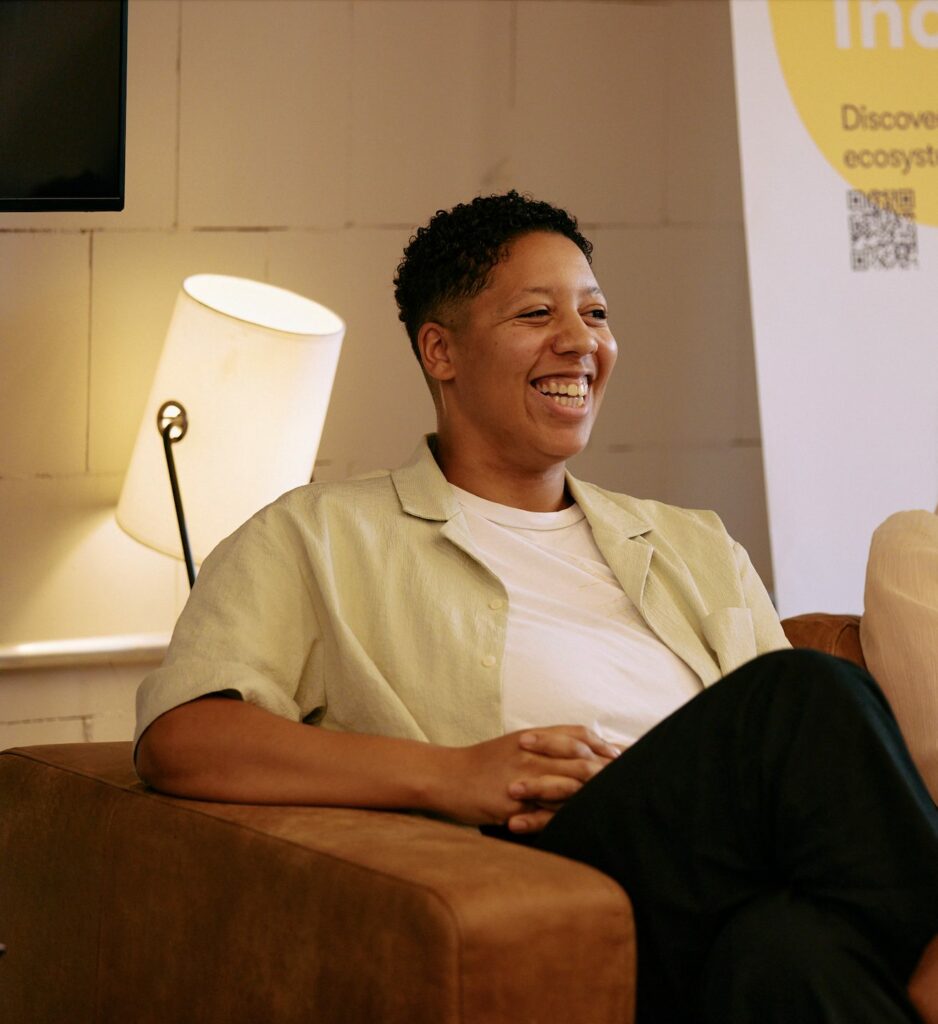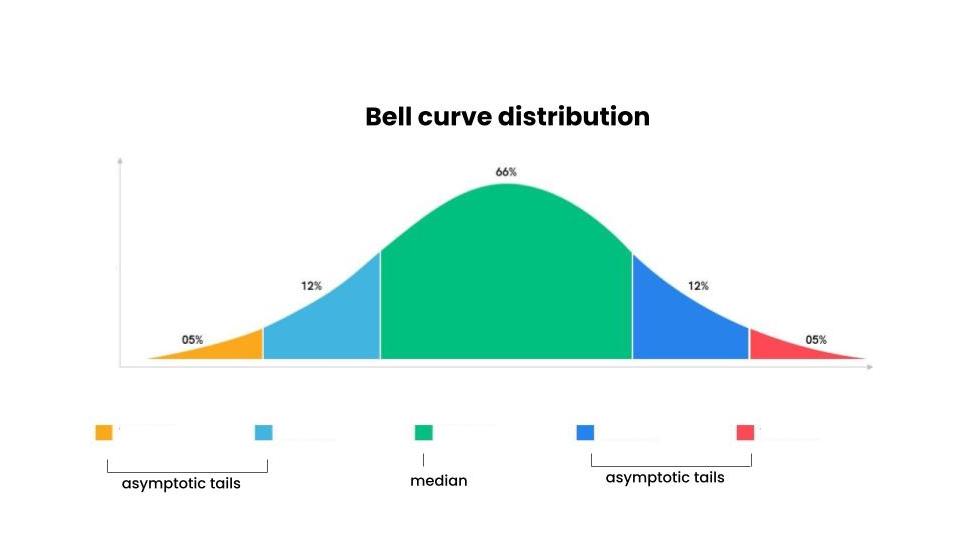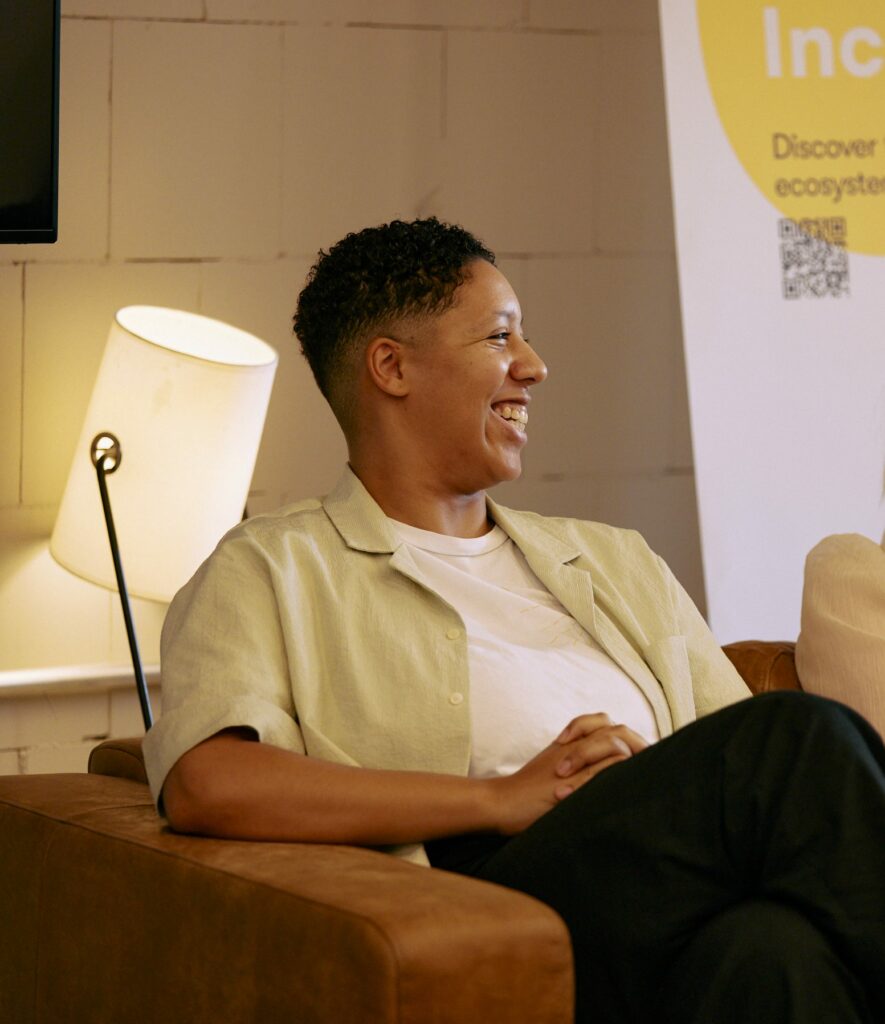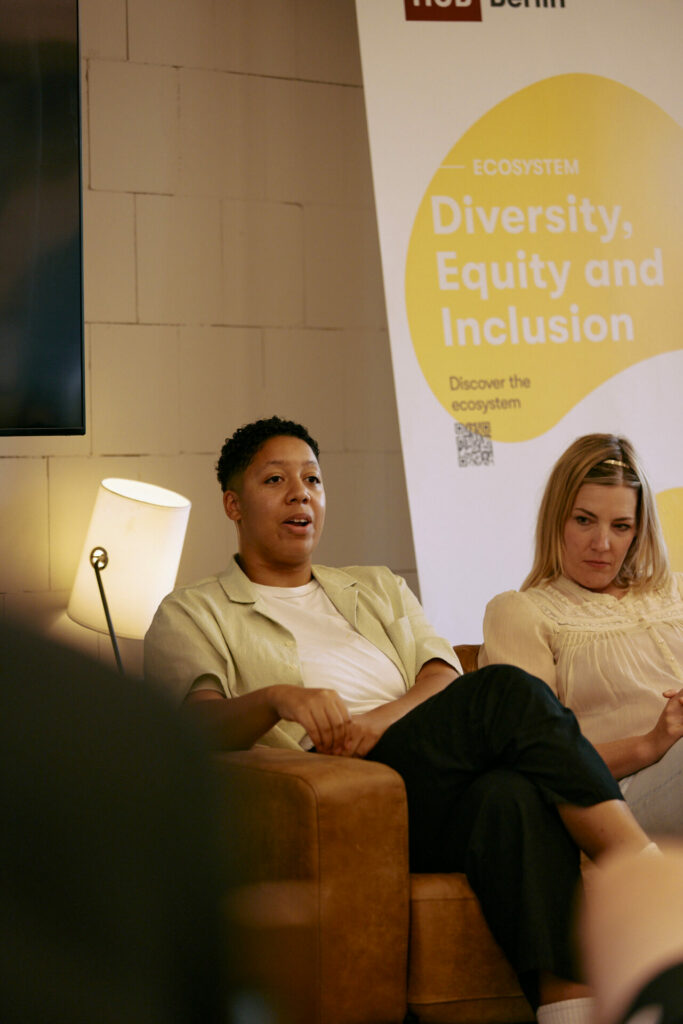Diversity and anti-discrimination in the tech scene in practice
An interview with Nora Mathelemuse, co-founder of all.txt

Hi Nora, can you introduce yourself?
I am Nora, and I go by they/them pronouns. I am currently developing a text editor that enables gender inclusive language for the German language. I am also part of the Grace Female Entrepreneurship Accelerator program. I come from a diverse background. I'm a self-taught data scientist, worked in the psychological field and also a few years in psychiatric facilities. I studied psychology and sociology and I have received two different fellowships with a focus on social justice, where I was able to dive deeper into the topics of gender and sexuality. Since then, I have been organising workshops and conferences around these topics and how they can become more inclusive.
I am passionate about gender diversity and justice, also due to my personal experience. This led me to founding all.txt, the text editor for gender inclusive language I have mentioned above.
What is happening at the moment in Germany
is that people are trying
to diversify tech a little bit,
but it often stops at gender and not at race, class, or religion.
You are a founder in the tech industry. What does the tech industry in Germany look like, and what kind of people are active in the field?
One thing that is very clear for me, based on the people that I met during my journey of learning how to code is the following: The ones that are getting the jobs, the ones who are having higher positions, are generally always very similar to one another. Often, it’s cis white men, who most of the time also have a very high education and a middle-class background that studied computer science and then specialised in a certain field. All in all, a very straightforward journey. I’ve seldomly come across people in high positions who, like me, came from a different industry and then broke into the tech industry. This leads to a high percentage of people being very similar to each other in terms of gender, race and background in this industry. Especially in the higher paid positions.
Some of the higher positions are being filled by white women. And it’s great that women are being put into power positions. However, I would say that this is neither diverse nor equal enough, because there are different people of different cultures living in Germany, who are super talented and knowledgeable, and could also take on those roles. I think many barriers still exist for people from minority backgrounds or identities.
Can you give an example of these barriers?
First of all, we need to think about the difference of holding a German passport or not, which immensely influences the hiring process. And even if you have a German passport, often people don’t get the chance of an interview due to discrimination and prejudice. There is prejudice against people with different skin colours, different names, and different religions. And lastly, there is language. Many German companies want their employees to speak German, and do so in a very native way. Berlin is very special in that sense that there are opportunities in the tech sector that allow for English speaking roles. However, oftentimes, when people from outside Germany get hired, they are getting paid less than their German colleagues even though they are doing the same work.

What is the impact of having a homogenous group of people shaping tech? How does it influence the innovations that are brought up there?
The most important aspect to mention is exclusion. If a homogenous group of people defines what ‘normal’ is, and builds models around it, people get excluded. Data scientists often don’t want to acknowledge certain data points, but rather declare them as an anomaly. And due to this, certain characteristics fall out of a model, and models are only built for a certain group of people, while others are excluded. If we want to approach this mathematically, we can describe what happens here with the Bell-shaped curve.
Many innovations are built for the middle part of the bell curve, not for the asymptotic tails on both ends of the curve, which are called anomalies. Minorities often stand at the two ends of the spectrum, thus falling out of the model. The problem with this is the following: For example, whiteness in Germany is dominant, thus falling into the middle part of the bell curve, whereas people with other skin colours might be in the asymptotic tail, and thus, these data points might be characterised as an anomaly. This might work for the majority of people in Germany, but if we are talking about the creation of tech products that might be used worldwide, problems occur.
Facial recognition software is used pretty much everywhere. When you have to prove your identity online, this is often based on an algorithm which checks whether or not the picture that you have loaded, and the photo that is on your identification documents are the same. A lot of times, these algorithms cannot recognize the photo of a person with a different skin colour than white, which then hinders the person from opening a bank account online. So those are things that are having an immediate impact on people and their daily lives.
What motivated me to build all.txt are two things:
Firstly, my personal struggle
of consistently experiencing
misgendering and exclusion
through language.
And secondly, the way language is being used
by the media to describe different groups.
Often, completely different words are used to demonise one group, while victimising another group through biased language.
With your startup all.txt, you have created a tech solution that works against these trends – can you tell us how?
My focus with all.txt is more on language. For me, language is a very powerful tool with which we communicate with one another and also create and express power dynamics, and show our mutual respect or disrespect. My co-founder and I are both fascinated by language and what language can do. all.txt’s focus is currently on making the German language more inclusive. What motivated me to build all.txt are two things: Firstly, my personal struggle of consistently experiencing misgendering and exclusion through language. And secondly, the way language is being used by the media to describe different groups. Often, completely different words are used to demonise one group, while victimising another group through biased language.
What we are trying to accomplish with all.txt is to help people overcome the sexism that is expressed through language by including groups of people that are generally being ignored. German is a very gendered language, but people often only use the generic masculinum in their day-to-day language. While all.txt is focused on the German language, I want to give an example in English: Take the term guys. Many people think that it is a gender-neutral expression, whereas it is actually describing a group of men. So while it suggests that all people in a room are meant when saying “guys”, it is actually excluding everyone who is not a man.
all.txt helps people to apply the habit of gender-inclusive language, as well as learning about pronouns and applying them. Many people face difficulties when it comes to applying gender-neutral language in German and using pronouns correctly. We want to help these people, and make their lives easier with all.txt.

How exactly does all.txt work? And what are your goals for the upcoming months?
We're working on a Google Chrome extension that would enable people to use our text editor inside their browser. Currently, we have a running prototype. We are about to do some tests with a focus group: People from diverse backgrounds and different age groups signed up to test the tool and give us feedback. At the same time, we are continuing to label more words, and to feed all.txt with more vocabulary. Beyond that, we are meeting experts who have built language models or are forerunners in shaping the German language before, who help us from a linguistic point of view.
Another vision of ours: We aspire to give workshops on these topics, and we would love our platform to educate our users. We do not simply want all.txt to give better suggestions, we are also keen for our users to understand the why behind it.
How did you get to developing all.txt? What was your founding history?
Through my education, I was already close to data and statistics. When I started programming in python and SQL, I realised how powerful data science actually is, and what it can do. I think the first thing that I did, when I was training on big data sets, was developing a little function that can calculate how many intersex people are in a larger data set. Often, the way data sets are set up is very exclusive. For example, I remember I had to do a competition in class, where we had to determine which gender was more likely to survive the Titanic. I remember how angry I was about that question, also because of the binary perspective of it. It assumed that everyone was either assigned man or woman at birth.
That’s when I realised I can have an impact by setting up data sets differently. Later on, when I wrote a biography about myself, using the pronouns I identify with and people know me as, it was edited and the pronouns were changed, because these people did not understand gender-inclusive language. So I thought to myself: Wow, how easy would it be to just have a text editor that could do this. Then I saw an opportunity with the Humanity in Action Fellowship. I applied with my project idea and got in. That’s how it started. This was next to a full-time job in the beginning, but since the end of September, I can fully focus on all.txt. This gave me the opportunity to hire freelancers and find my co-founder So Jin Park.

How did you come to Impact Hub Berlin? How do you like it there, and what do you value about it?
I got in contact with Impact Hub Berlin through their Empower Now program, which I applied for, but sadly, I didn’t get a spot. It is part of Impact Hub Berlin’s Diversity, Equity and Inclusion ecosystem. But there were other opportunities: Through my application, I received a free connect membership and with that came so much more: I gained access to the incredible network that Impact Hub Berlin has to offer. I also met people whom I knew before, but now I can meet them through a different lens. The opportunities to network and connect with other members are really powerful at Impact Hub Berlin.
I also cherish the fact that there are so many workshops and seminars one can attend to gain more knowledge. Especially from a founder’s perspective, for example, when it comes to finding financial or legal advice it is really helpful. Sometimes you just need a helping hand that navigates you through these matters.
And lastly, I really love the fact that Impact Hub Berlin is so open, and the atmosphere is so casual, even though a lot of things are happening there.
So Jin and you are trying to work as non-hierarchical as possible. How do you create such a non-hierarchical work environment?
When So Jin and I met, we discussed questions like: What are the ways of working together? And how do we want to work together? I think these conversations are extremely valuable. Not many people have the possibility to have this conversation prior to starting a job, as the decision-makers in well established companies basically ask their employees to work in a way that they want them to.
So Jin and I both need freedom and connection. We have irregular meetings on demand, so every time there is a need to discuss things. But we also enjoy working independently from each other. So Jin is a UX designer and has a background in Journalism as well as graphic design. In the wider team, we don’t exclude people based on their work experience, but we rather determine whether someone is willing to learn. And whether they are self-driven. These are the things that we are looking for.
Hiring managers need to ask themselves: Do I only want to hire this person because they seem close to me? Or because they challenge me?
What support structures does it need to support more diverse tech solutions around DEI? What is needed to enable people from different backgrounds to (co-)create solutions?
One thing that definitely has to change is the hiring process – also internally. I am not saying that companies just have to hire a lot of people from different backgrounds, it is a bit more nuanced than that. Because there are a lot of tech companies that have, technically speaking, diverse employees. However, most of the time, people with a diverse background are all on the same lower levels, and never make it to senior management. And in the rare case that they do, they are quite similar to the existing people in management, and don’t actually bring a different perspective.
This is a problem, because it creates very slim chances for change. Hiring managers need to ask themselves: Do I only want to hire this person because they seem close to me? Or because they challenge me? Do I have the capacity to learn with them? And do the other colleagues have that capacity, too? Or are my colleagues so far away from learning that we need to learn internally first in order to improve the hiring processes. And each person that we are onboarding, is also willing to learn and has more of an open mindset? I think those are super, super important aspects of how to create more diversity in a given company.
Another key thing is to listen to employees, and not penalise them for speaking up, especially when it’s about discrimination at the workplace. Having an investigation and not pointing fingers at the person who is being discriminated against is extremely needed. I experienced it myself: Often, when you speak up against discrimination, you become the problem, and nothing changes.

You are also passionate about privacy & data protection in the tech industry. Can you tell us, from your perspective, why it is important? What are the key threats that you see?
In my opinion, privacy doesn’t really exist if you have a profile online. This statement often frightens people, and many react by saying that it doesn’t matter, as they don’t have anything to hide. I believe this undermines the discussion, as we are all private people. The tech industry thrives on gathering data from the internet, as they can profitably sell it to companies that create personalised advertisements, which increases the likelihood of you buying a product. When I look at my own Instagram feed, and the ads that I get, many of them are really interesting to me. And I think that a company having that kind of knowledge over me is already too much knowledge.
But there is more: When we post pictures online, we need to be aware that there is more data behind a picture: These pictures have a location, a time stamp, potentially the phone type from which the picture was taken and potentially even the IP address from which this picture was uploaded. So it’s just good to keep these things in mind. And lastly, we should be more aware of phishing: People using the faces of our loved ones on pictures online, to scam you, spread disinformation, start smear campaigns or sell your pictures elsewhere without your knowledge.
Lastly, who and what inspires you, in terms of people and activists in the diversity & anti-discriminatory field?
Something that I find really incredible is to see the ingenuity of black people in tech, and also the networks that exist between black people in tech.
And two of those people I would like to give a shout out to: Dr. Nakeema Stefflbauer , who speaks out about algorithmic discrimination, from her own perspective, but also as an angel investor and as a lecturer on these topics. She is deeply embedded in the tech scene and hearing her speak, it just really resonated with me.
The other person is Joy Boulamwini, who founded the algorithmic Justice League, which is an organisation that tries to create solutions and also speaks out on a policy level against algorithmic discrimination that exists within AI. I think she first came across this during her research time at MIT, where she worked on a facial recognition robot, and other facial recognition products. The robot would not recognize her face because she’s black and a woman. This is because the algorithm was not trained on a diverse data set. She found out through her work that other organisations which are creating AI products use the same data sets. So with that, the discrimination against black women goes on. Because of this, she created the algorithmic Justice League.
To follow both of their careers and their passions, and also the power that they’re bringing into the tech scene is super inspiring for me. I find it so incredible that there are people out there that have been doing this work for such a long time. Essentially, both of them made it possible for me to join, because if it wasn’t for people like Dr.Nakeema Steffelbauer and Joy Boulamwini, tech would be even less diverse with no driving voices for change.

If you are interested in the work that all.txt does and want to try out their Beta version, you can sign up as a tester and the all.txt team will be in contact with you!
Impact Hub Berlin’s Diversity, Equity & Inclusion activities are part of our impact ecosystem committed to fostering innovation and enabling collaboration across organisations, cultures and generations to solve the challenges facing the world today. Our Diversity, Equity & Inclusion team receives assistance and counselling from an advisory board, an intersectional group of FINTA founders. Stay tuned for more exciting news from the DEI ecosystem!